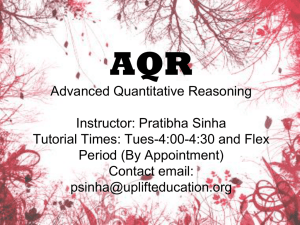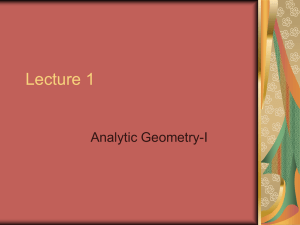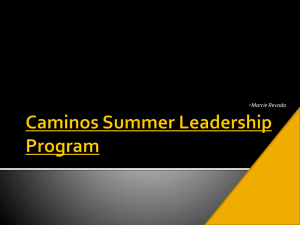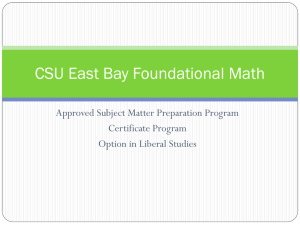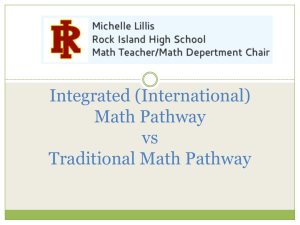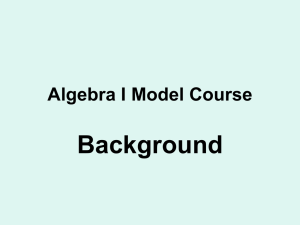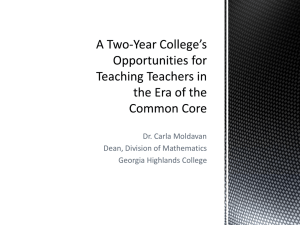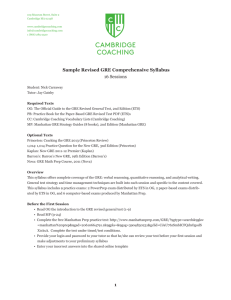Mathematics GRE Workshop
advertisement
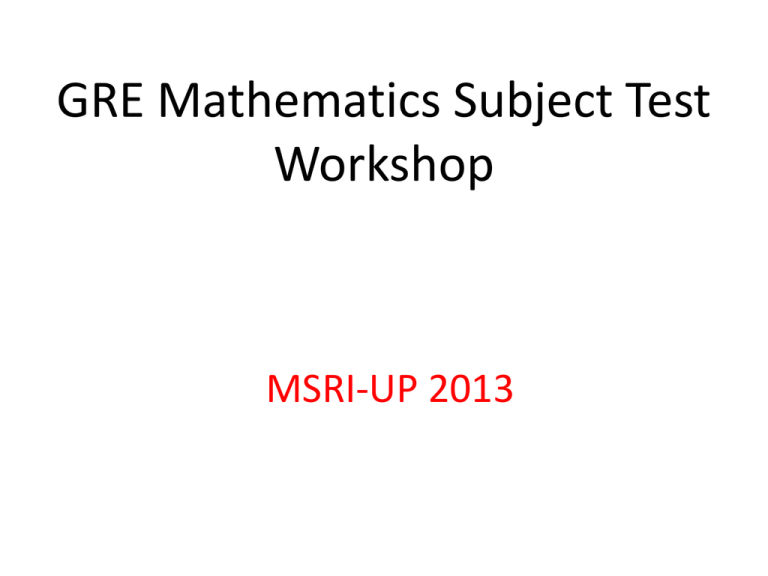
GRE Mathematics Subject Test Workshop MSRI-UP 2013 Is the GRE Important? • Yes, the GRE general test (similar to SAT, but harder) is required by essentially all grad programs. Prepare for it! • Yes, the GRE Mathematics Subject Test is also very important. – Many programs and most “top 25” mathematical sciences graduate programs require it, and thus, use it as part of their acceptance and financial aid decisions – Take it seriously and prepare for it! GRE Mathematics Subject Test Basics • Paper-based test given at various test centers • Register online, costs $150 www.ets.org/gre/subject/about/ • Three test dates per year next three: 28 Sept 2013, 19 Oct 2013, 05 April 2014 • Registration deadline ≈ 5 wks before test (late deadline 1 wk later for $25 more) • Scores online/phone ≈ 1 mo after test; mailed to grad schools ≈ 5 wks after test • Only 3-4 sharpened No. 2 or HB pencils and a good eraser allowed (i.e., no calculator) Content Overview • The test consists of approximately 66 multiple-choice questions drawn from courses commonly offered at the undergraduate level. Test time is 170 minutes (i.e., 2:35 per question). • Approximately 50% of questions involve calculus and its applications — subject matter assumed common to the backgrounds of almost all mathematics majors. • About 25% of questions are in elementary algebra, linear algebra, abstract algebra and number theory. • The remaining questions deal with other areas of mathematics currently studied by undergraduates in many institutions. Calculus, 50% Differential and integral calculus of one and of several variables — includes calculus-based applications and connections with coordinate geometry, trigonometry, differential equations and other branches of mathematics. Algebra, 25% • Elementary algebra: basic algebraic techniques and manipulations acquired in high school and used throughout mathematics • Linear algebra: matrix algebra, systems of linear equations, vector spaces, linear transformations, characteristic polynomials and eigenvalues and eigenvectors • Abstract algebra and number theory: elementary topics from group theory, theory of rings and modules, field theory and number theory Additional Topics, 25% • Introductory real analysis: sequences and series of numbers and functions, continuity, differentiability and integrability, and elementary topology of R and Rn • Discrete mathematics: logic, set theory, combinatorics, graph theory and algorithms • Other topics: general topology, geometry, complex variables, probability and statistics, and numerical analysis • • • • Preparation Tips Become a calculus tutor Say “Yes” if asked to tutor linear algebra Help friends with their math courses Download official practice book today www.ets.org/s/gre/pdf/practice_book_math.pdf • Start preparing at least 2 months before test • Find a “study buddy” for the test and establish at least 2 weekly 60-minute meeting times • Establish a problems/week goal Preparation Tips (cont’d) • Do a minimum of two practice tests in test-like conditions, i.e., by yourself in 170 minutes. – There are three other old exams on Western Michigan University’s Math Club website www.wmich.edu/mathclub/gre.html • Princeton Review has a prep book (mixed reviews b/c not enough problems) for $13.73 on amazon (ISBN: 0375429727). • There is another prep book (mixed reviews) for $12.53 on Amazon (ISBN: 0738608386). Book has 6 practice “made-up” exams. Test-Taking Tips • Go to practice book • Other tips from those in the room that are good at taking standardized tests? Let’s do some problems! Questions/Comments Email me (hmedina@lmu.edu) or Dr. Rubio to get a copy of this presentation

